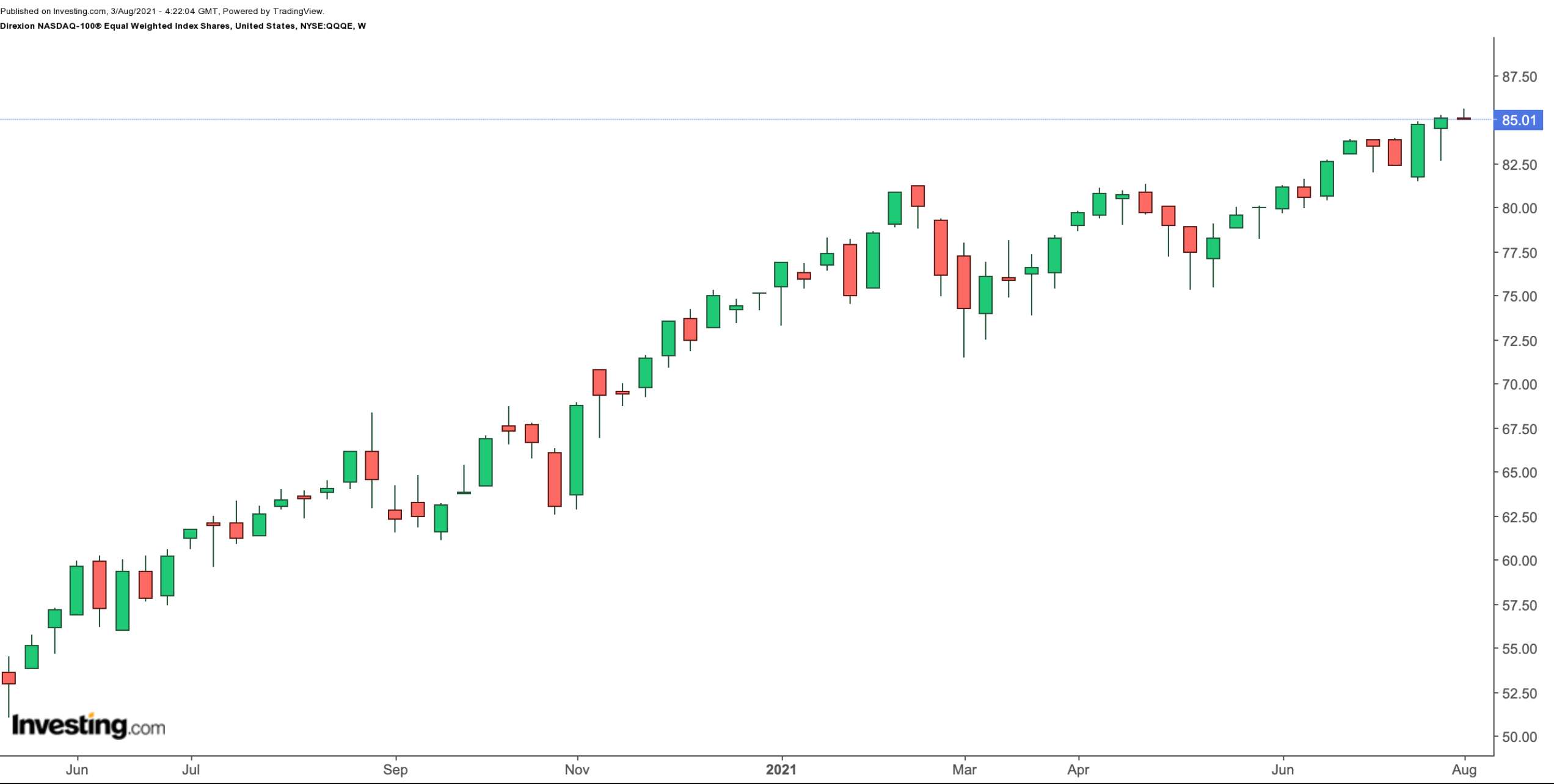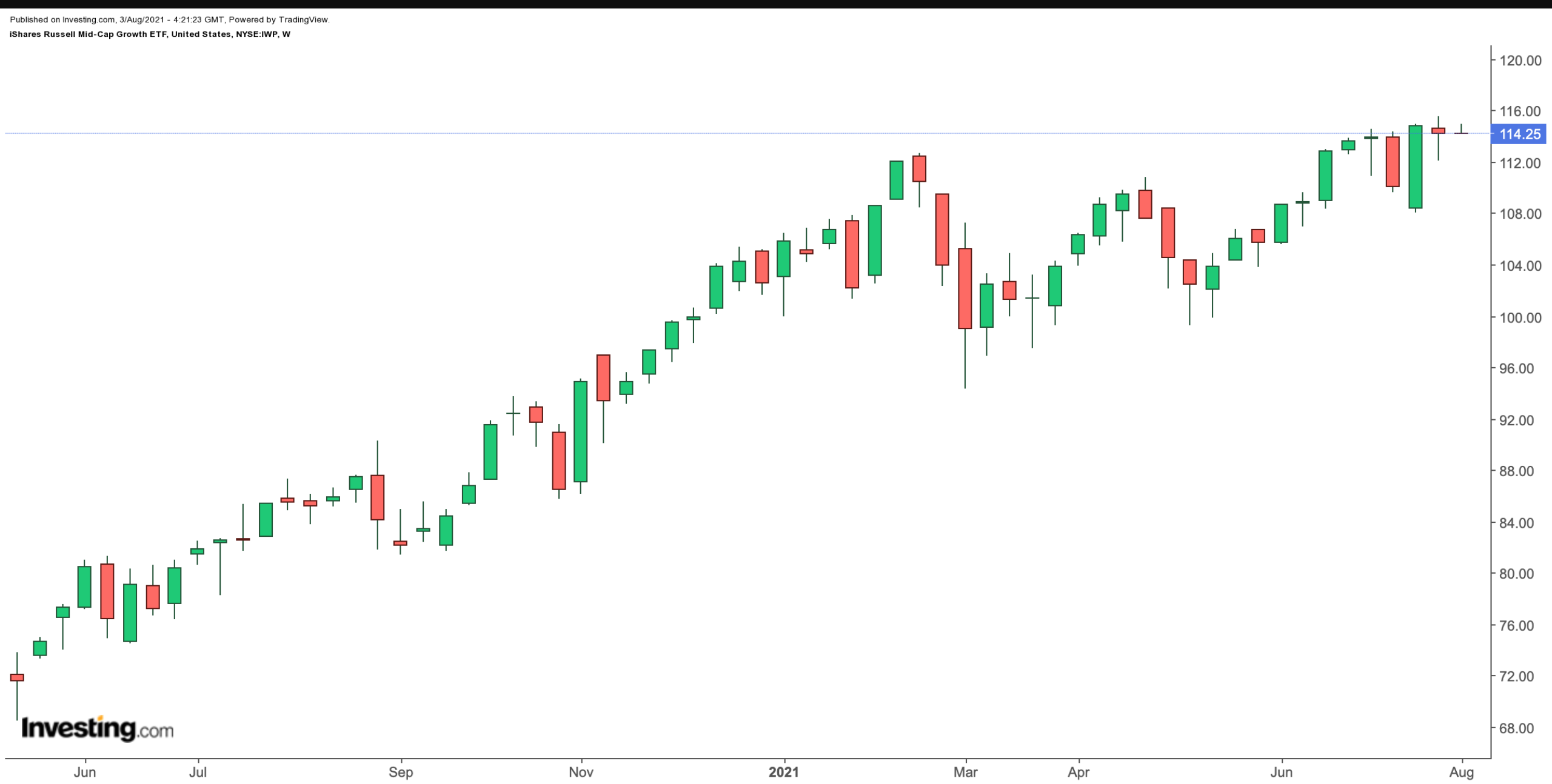July was jam-packed with earnings releases and results have shown that profit growth continues despite higher inflation. And on July 28, the Fed left interest rates and its bond-buying program unchanged. The policy statement released after the meetings said, "The economy has made progress,” and did not see higher inflation as a permanent risk factor.
Wall Street paid close attention to the words of Fed Chair Jerome Powell, who highlighted the importance of more job gains before the central bank would halt bond buying. Overall, the Fed did not seem overly concerned about the rapid increase in COVID-19 cases.
The upbeat words from the central bank could be music to the ears of equity bulls, especially those who include growth shares in their long-term portfolios. Therefore, today we introduce two such funds.
1. Direxion NASDAQ-100 Equal Weighted Index Shares ETF
Current Price: $85.01
52-Week Range: $61.09 – $85.25
Dividend Yield: 0.45%
Expense Ratio: 0.35%
The Direxion NASDAQ-100® Equal Weighted Index Shares (NYSE:QQQE) provides equal-weight exposure to stocks in the NASDAQ 100 index, which includes 100 of the largest non-financial companies on the NASDAQ.

The fund started trading during March 2012. In terms of sectors, we see information technology (41.35%) followed by communication services (12.99%) and consumer discretionaries (15.06%). The top 10 names make up about 52% of net assets of almost $405 million.
QQQE, which has 100 holdings, tracks the returns of the NASDAQ 100 Equal Weighted index. Each security in the index starts with a weight of 1%, and the index is rebalanced quarterly.
In the NASDAQ 100 index, however, a small number of heavyweights, like Apple (NASDAQ:AAPL), Microsoft (NASDAQ:MSFT) and Amazon (NASDAQ:AMZN) lead. Their respective weightings are 10%, 9.82%. and 8.35%.
As a result, changes in prices of AAPL, MSFT and AMZN shares affect the performance of the NASDAQ 100 index. But in the case of the NASDAQ-100 Equal Weighted Index, their weighting is 1%. Therefore, their effect on the fund is not extensive.
Being overweight in these stocks over the years has been profitable for many buy-and-hold investors. But their heavy weighting in major indices, like the NASDAQ 100, could also be a concern to some.
Tech stocks have been showing a strong performance since mid-May, and QQQE hit an all-time high in recent days. So far in the year, the fund has returned 13.2%. By comparison, the Invesco QQQ Trust (NASDAQ:QQQ), which follows the NASDAQ 100 index, returned 16.2%.
Investors who want to take some concentration risk off the table in anticipation of choppiness in stocks like AAPL, MSFT or AMZN, might consider buying QQQE. The equal weighting of the fund typically could help smooth out short-term volatility, especially at times when the tech heavyweights might decline.
2. iShares Russell Mid-Cap Growth ETF
Current Price: $114.25
52-Week Range: $81.44 – $115.53
Dividend Yield: 0.34%
Expense Ratio: 0.23%
The iShares Russell Mid-Cap Growth ETF (NYSE:IWP) gives exposure to mid-sized US companies whose earnings are expected to grow above the average rate relative to the broader market.

IWP, which has 387 holdings, tracks the investment results of the Russell Mid-Cap Growth Index. The fund started trading in July 2001, and its net assets stand around $16 billion.
Information technology stocks have the highest weighting, with 34.05%. Next in line are health care (17.59%) and consumer discretionaries (16.11%). The leading 10 stocks make up about 11% of the fund, which tells us that this fund is quite diversified. Many of the names in the fund have market caps of about $60 billion each.
IDEXX Laboratories (NASDAQ:IDXX), which provides animal veterinary products; e-signature platform DocuSign (NASDAQ:DOCU); television streaming platform Roku (NASDAQ:ROKU); restaurant chain Chipotle Mexican Grill (NYSE:CMG); and Veeva Systems (NYSE:VEEV), which provides cloud services for life science companies; lead the names in the roster.
The fund returned 35% in the past year and 11% so far in 2021. IWP also hit a record high in late July. An ETF like IWP could be appropriate for investors who already own big tech and large-cap growth names and are looking for diversification with a growth focus.
